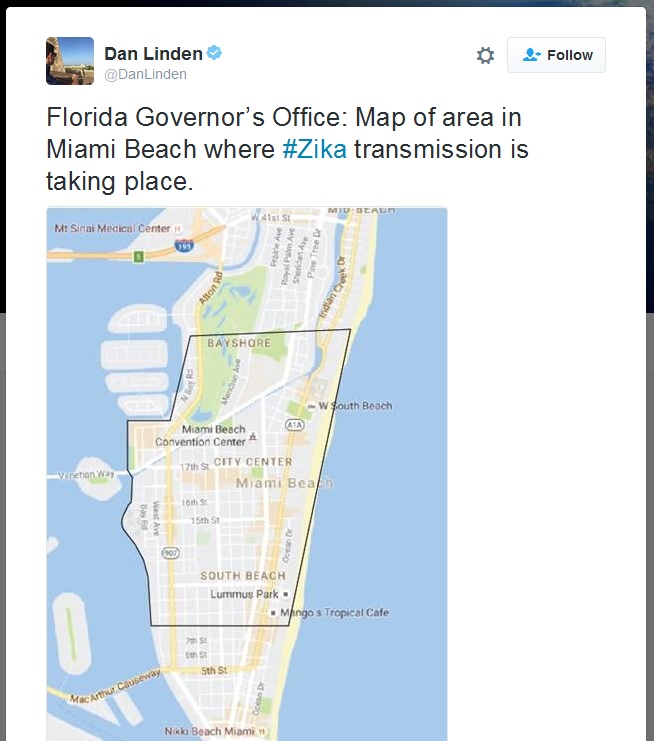37 people have now contracted Zika locally in Southern Florida. There are also over 400 travel- related cases of Zika in the state. Out of those infected in Florida, 68 cases involving pregnant women have been confirmed. Two areas of the popular tourist destination, including a part of South Beach, have been labeled transmission areas. The CDC has released travel advisories for pregnant women considering traveling to the area. Five people have been confirmed to have contracted the virus at South Beach.
““Pregnant women should avoid travel to the designated area of Miami Beach, in addition to the designated area of Wynwood, because active local transmission of Zika has been confirmed,” CDC director Dr. Tom Frieden said Friday.

The streets thought to be in the transmission area are 1.5 square miles bewteen 8th and 28th streets.

Zika can be contracted via bite from a mosquito and through sexual intercourse with someone infected with the Zika virus. Until now local infections have been restricted to a neighborhood in north Miami known as Wynwood.
The five newly discovered South Beach cases include three men and two women, three of them tourists visiting from New York, Texas and Taiwan.
The two transmission zones are not the only areas of Miami-Dade County where people infected with Zika have been found. On the contrary, Florida health officials have investigated at least four instances of mosquito-borne Zika transmission in Miami-Dade County. Frieden told reporters “These are individual instances, and do not represent spread throughout the area.”
Governor Rick Scott has asked the CDC for additional Zika tests, lab support and addition prevention kits. The kits include insect repellent, tablets that can be placed in standing water to kill larvae, mosquito nets and condoms, along with educational information about the virus and protection against mosquito bites. The governor has also requested additional resources from the federal government to fight and prevent Zika.
Some would say the governor isn’t doing enough. Scott has faced backlash and accusations of hiding how high the local Zika infection numbers really were in an attempt to protect the tourism revenue.
Governor Scott said the state continues to offer free mosquito spraying to businesses, particularly those that attract the largest amounts of tourist. Scott added that he’s directed the Department of Business and Professional Regulation to provide information about Zika to hotels, attractions and restaurants in Miami-Dade County.
Despite the rising number of locally contracted infection and the fact that Florida is the only state where mosquito-borne infections have occurred, the governor feels people have no reason to worry. “We have a safe state and we’re going to keep it that way,” said Scott in a news conference Friday afternoon. Though the federal government has issued a travel warning for pregnant women to the Miami Beach and Wynwood areas of Florida, the governor still refuses to issue a state travel warning. “Put it in perspective, we have 36 cases, we have 20.6 million people that live in our state, we’ve probably had 65 million tourists come to our state this year,” Scott stated.
One of Scott’s most vocal critics over the weekend has been South Beach Mayor Philip Levine. He personally joined Miami’s Public Works crew in cleaning out storm drains with vacuum trucks on Sunday morning along South Beach. The mayor has claimed that he and his staff were left in the dark by the governor and local heath department.
Levine voiced his frustration saying the “governor and health department are not talking to us, they’re not giving us any information. We knew that there were two unconfirmed cases on Thursday. The following day the governor did a press conference and did not let myself or [Miami-Dade] Mayor Carlos Gimenez know. We were caught flat-footed.”
Miami Beach Public Works crews dropped pesticide pellets into sewer drains and teams from the Miami-Dade Mosquito Response Unit went door to door handing out informational flyers. Mayor Levine says his first priority is the health of residents and tourists and then his second priority is business and tourism. “Information is important; we don’t want to play around with people’s lives. This is serious stuff, we need the information.” He added.
The Zika virus is not deadly and many people who contract the illness may not even know they have been infected. The virus is most dangerous to pregnant women. Zika has been linked to microcephaly, a devastating birth defect where babies are born with smaller than normal heads and underdeveloped brains. To avoid contracting the virus, the CDC advises pregnant women not to travel to an area where Zika has been found locally and to use insect repellent and wear long pants and long-sleeved shirts if they are in those areas. Because Zika can be spread through sexual intercourse, the CDC also advises partners of pregnant women are advised to use a condom to guard against sexual transmission of the illness.
Florida is the only state in the U.S. to have reported locally contracted cases of the Zika virus. If you think the numbers in Florida are scary you should do your research on Zika infections in the U.S. territory of Puerto Rico. Zika has been declared a public health emergency due to it’s rapid spread. There are over 10,600 cases of Zika in Puerto Rico, with 1,035 of them being pregnant women. In an indication of what can occur when diseases mutate, 30 people in Puerto Rico have been diagnosed with Guillain-Barre syndrome, a rare paralyzing condition that can be caused by Zika infection.












